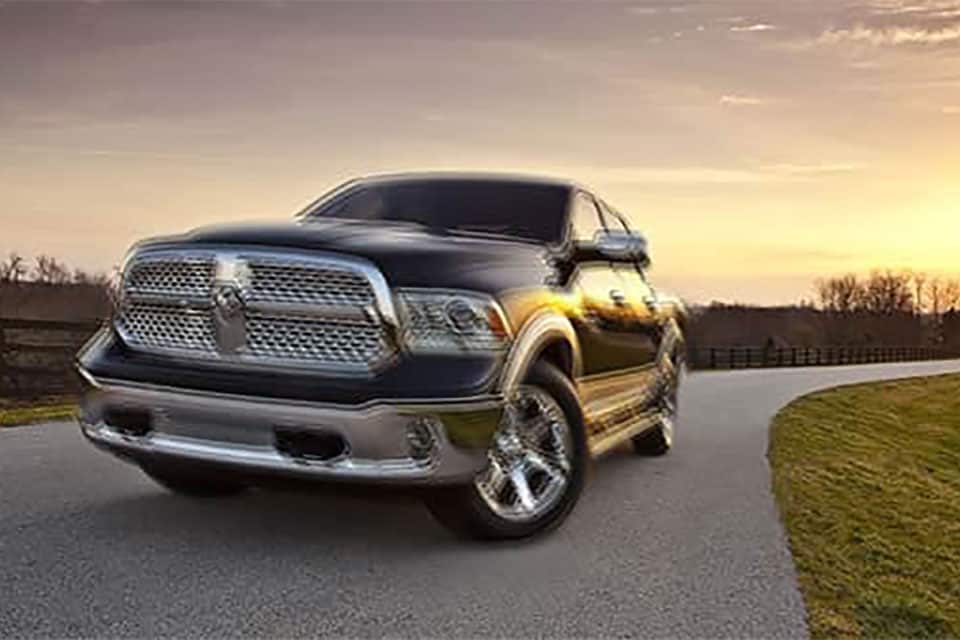The Dreaded 'Death Wobble' in Ram Trucks
- Dodge's largest vehicles experience strong front-end vibrations at highway speeds.
- It's so common that owners have started calling it the "death wobble."
- The problem really faded away once Dodge redesigned their steering system in 2013.

Some Dodge Ram trucks are experiencing violent front end vibrations at highway speeds after hitting a bump in the pavement. Have you traveled on a major highway recently? Let's just say you have a better chance of not hitting traffic than a bump in the road.
The wobble has been called demonic. Others have called it the worst possible downside of having a coil-sprung front suspension on a truck with a track bar. Whatever it is, everyone has called it dangerous. Unlike a normal suspension, Dodge Ram trucks will continue to shake long after hitting the bump to the point that controlling the vehicle is nearly impossible until the driver slows down.
Ram Trucks with the Death Wobble ∞
The phrase "death wobble" was originally used by Jeep Wrangler owners to describe a similar vibration problem.
For Dodge owners, the issue affects the:
It also affects the 2007-2012 Dodge Ram 3500 Cab Chassis, 2008-2012 Dodge Ram 4500, and the 2008 Dodge Ram 5500.
Death Wobble Class-Action Lawsuit ∞
Richard Samuel, owner of a 2007 Dodge Ram 3500, filed a class-action lawsuit accusing Dodge trucks of wobbling out of control at highway speeds. The lawsuit makes a few arguments about the driver's tie-rod:
- The ball stud is defective. The driver's side tie-rod ball stud Chrysler used is too weak to and is known to fracture under normal driving conditions
- The tie rod is a "crucial link" in the vehicle's steering system. A loose tie rod can cause any vehicle to have excess shimmy or, in cases like this, the dreaded death wobble.
- The tie rod can affect front-end alignment. When the vehicle's alignment falls out of whack, it can cause the vehicle to suddenly pull to one side of the road. Knowing Dodge Ram owner's luck, that's probably the side of the road with all the bumps.
The lawsuit alleges that Chrysler has known about the defect for years, but did nothing about for years when they started issuing some recalls. Great, right? Well the lawsuit says the recalls were not only ineffective at fixing the issue, they also excluded trucks that had the problem.
The lawsuit also says Chrysler didn't provide enough parts to dealers to fix the recalled trucks but that didn't matter since the replacement parts were defective anyway.
FWIW, Chrysler Redesigned Their Steering System in 2013 ∞
Beginning in the 2013 model year Chrysler redesigned its trucks (and changed the brand name to just Ram) with a new reciprocating ball steering gear that provides greater durability and control. The trucks also have better steering knuckles, ball joints and more robust linkages.
Did I mention they haven't had any death wobble issues? Hmm.
Lawsuits Regarding This Problem
Lawsuits about this problem have already been filed in court. Many times these are class-action suits that look to cover a group of owners in a particular area. Click on the lawsuit for more information and to see if you're eligible to receive any potential settlements.
Settled Shaun Sater, et al. v. FCA US LLC
5:14-cv-00700Settled
The class-action lawsuit will be settled after Chrysler agreed to the settlement terms that allege Ram trucks were built with tie rods that can break and cause crashes and injuries.
Case Filed
Chrysler has been hit with a class-action lawsuit that claims tie rods can break in numerous models of trucks and cause a total loss of steering.
Generations Where This Problem Has Been Reported
This problem has popped up in the following Dodge generations.
Most years within a generation share the same parts and manufacturing process. You can also expect them to share the same problems. So while it may not be a problem in every year yet, it's worth looking out for.
3rd Generation Dakota
- Years
- 2005–2011
- Reliability
- 28th out of 54
- PainRank™
- 10.29
- Complaints
- 223
2nd Generation Ram 1500
- Years
- 1994–2001
- Reliability
- 42nd out of 54
- PainRank™
- 21.3
- Complaints
- 2060
3rd Generation Ram 1500
- Years
- 2002–2008
- Reliability
- 52nd out of 54
- PainRank™
- 57.14
- Complaints
- 3501
4th Generation Ram 1500
- Years
- 2009–2011
- Reliability
- 53rd out of 54
- PainRank™
- 58.97
- Complaints
- 629
2nd Generation Ram 2500
- Years
- 1994–2002
- Reliability
- 24th out of 54
- PainRank™
- 5.9
- Complaints
- 519
3rd Generation Ram 2500
- Years
- 2003–2009
- Reliability
- 41st out of 54
- PainRank™
- 20.39
- Complaints
- 827
4th Generation Ram 2500
- Years
- 2010–2011
- Reliability
- 27th out of 54
- PainRank™
- 9.33
- Complaints
- 69
2nd Generation Ram 3500
- Years
- 1994–2002
- Reliability
- 21st out of 54
- PainRank™
- 3.59
- Complaints
- 134
3rd Generation Ram 3500
- Years
- 2003–2009
- Reliability
- 39th out of 54
- PainRank™
- 19.54
- Complaints
- 358
4th Generation Ram 3500
- Years
- 2010–2011
- Reliability
- 32nd out of 54
- PainRank™
- 14.8
- Complaints
- 53
4th Generation Ram 4500
- Years
- 2008–2011
- Reliability
- 1st out of 54
- PainRank™
- 0.22
- Complaints
- 3
4th Generation Ram 5500
- Years
- 2008–2011
- Reliability
- 10th out of 54
- PainRank™
- 0.6
- Complaints
- 3